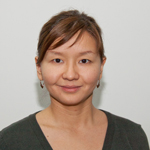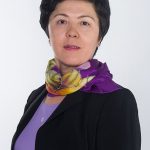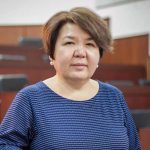The Bachelor of Economics program teaches students to analyze complex social and economic systems and provides them with an excellent training for different career paths. Studying economics helps a student to thoroughly understand business, markets, finance, trade, government policy, international issues, globalization, health, labor, development, and environmental problems.
Our Faculty
Our faculty is comprised of a team of experienced academics with doctoral degrees from leading universities abroad (Germany, USA, Sweden, UK, Russian Federation). Our professors are actively conducting research, and have outstanding publication records. All full-time professors publish internationally.
National ratings and International accreditation
- Top-ranked for “Economics” programs by the National Ranking of Educational Programs: Bachelor Programs (IQAA RK) in 2020
- As a student of the Program you get an internationally accredited degree confirmed by the Foundation for Business Administration Accreditation (FIBAA), Germany
To earn a Bachelor of Economics a student must complete 146 credits/240 ECTS.
| Credits | ECTS | |
| General Education Requirements | 36 | 56 |
| Program Foundation Requirements | 68 | 112 |
| Program Required Courses | 36 | 60 |
| Final Attestation | 6 | 12 |
| Total Required for Graduation | 146 | 240 |
Students should choose the General Education courses with the assistance and advice of the academic advisors. The following are some guidelines for students in the BAE program.
General Education Requirements can be found in the General Education section of the Catalog.
Program Foundation Required Courses (32 credits/52 ECTS)
| Course Code | Course Title | Credits | ECTS | Prerequisites |
| KAZ/RUS21021.2 | Prof Kazakh (Russian) Language | 2 | 3 | None |
| ENG1110 | Academic Speaking | 3 | 5 | None |
| ENG1121 | Academic Reading and Writing II | 3 | 5 | None |
| ECN1101.2 | Introduction to Economics | 2 | 3 | ENG0004 |
| ECN1201 | Math for Business and Economics | 3 | 5 | ENG0004 |
| ECN2083 | Introduction to Statistics | 3 | 5 | ECN1201 |
| ECN2103 | Principles of Microeconomics | 3 | 5 | ENG0004 – cannot be counted as a separate course from FIN2105 Business Microeconomics |
| ECN2102 | Principles of Macroeconomics | 3 | 5 | ENG0004 – cannot be counted as a separate course from FIN2106 Business Macroeconomics |
| ECN3184 | Econometric Methods | 3 | 5 | ECN2103, ECN2102 & ECN2083 |
| ECN3888 | Academic Internship | 3 | 5 | None |
| PAD2700.2 | Fundamentals of Sociology | 2 | 3 | ENG0004 |
| POL1704.2 | Fund. of Political Science | 2 | 3 | ENG0004 |
| Total | 32 | 52 |
Program Foundation: Elective Courses – for more information please consult with CSS Program Coordinator at css_coordinator@kimep.kz.
Majors and minors
The Department of Economics offers the following majors (specializations) to students:
- Financial Economics
- Business Economics
- Public Policy Economics
And the following minors:
- Mathematics
- Economic Policy and Development
- Economics and Law
- Financial Economics
GEN1201/ECN 1201 Mathematics for Business and Economics (3 Credits)
Prerequisites: ENG0004 Foundation English Level 4
The course develops the basic concepts of mathematical analysis used in economics and business with emphasis on differentiation and integration of single real-variable functions and matrix algebra. The approach to these concepts is intuitive and visual. The formal proofs are given only when they help in understanding concepts. Applications to economics, business and social science as well as computational realizations are studied.
ECN2083 Introduction to Statistics (3 Credits)
Prerequisites: GEN1201 (Not available to students who have credit for OPM2201 or STAT2101)
This course introduces the basic concepts of study design, data collection, data analysis and statistical inference. Topics include an overview of observational and experimental study designs; graphical and numerical descriptive statistics; probability distributions for simple experiments and for random variables; sampling distributions, confidence intervals, and hypothesis testing for the mean and proportion in the case of one sample. The emphasis is on developing statistical reasoning skills and concepts; computational skill is secondary. Students are taught the use of statistical software to handle the computations.
ECN2102 Principles of Macroeconomics (3 Credits)
Prerequisites: All required GE English courses
This course provides basic understanding of a typical market-based economy from society’s point of view. It includes national income analysis; the traditional theory of income and employment; economic fluctuations; the economic role of the government; government expenditures and taxation; money and banking; economic growth; and international economics.
ECN2103 Principles of Microeconomics (3 Credits)
Prerequisites: All required GE English courses
This course provides students with a basic understanding of how markets work. At the end of the course, students should be able to: understand and explain the basic problems in micro economics; demonstrate knowledge of basic microeconomic terms, concepts and models; correctly apply microeconomic terms and concepts when discussing economic issues; and appreciate the contributions, as well as the limits, of microeconomics in solving current economic problems.
ECN3081 Intermediate Microeconomics (Microeconomics, 3 Credits)
Prerequisites: ECN2103 or FIN2105. Alternatively ECN1101 with minimum grade B minus.
This course falls between Principles of Microeconomics and Advanced Microeconomics. Topics include consumer theory, firm production and costs, decision-making under perfect competition, imperfect competition, monopoly, and oligopoly. Students can diagnose and solve microeconomic problems using the economic concepts and tools acquired in this course.
ECN3082 Intermediate Macroeconomics (Macroeconomics, 3 Credits)
Prerequisites: ECN2102 or FIN2106. Alternatively ECN1101 with minimum grade B minus.
This course provides the theoretical background to analyze macroeconomic phenomena. Several competing theories will be introduced to discuss controversial issues of employment, inflation and government policies. Traditionally, Keynesian and Classical theories are debated in depth in this course. Theories like the Real Business Cycle Model also will be included.
ECN3103 Quantitative Methods for Economics (3 Credits)
The course provides necessary concepts of one and multivariable calculus as well as the theory of matrices needed for mathematical economics, econometrics, and financial mathematics. The course emphasizes intuition and conceptualization, avoiding difficult proofs. The course applies these concepts to economics, business, and other social sciences.
ECN3184 Econometric Methods (3 Credits)
Prerequisites: ECN 2103 (alternatively FIN2105), ECN 2102 (alternatively FIN2106) and ECN2083 (alternatively GEN2400 or GEN2402)
This course introduces regression techniques widely used in economics and finance. It discusses basic procedures for estimating equations and testing hypotheses; the use of one or more independent variables; and problems in time series or cross-sectional data (for example, a dataset of income in each Kazakhstani oblast for a given year).
ECN4104 Research Methods and Methodology (Data analysis) (3 Credits)
Prerequisites: 90 Credit hours
This course introduces students to methods and methodology of research in economics. It discusses issues such as organizing a research project, collecting data and it provides them with techniques of statistical and data analysis such as cluster analysis and factor analysis. The course will guide the students towards developing their own research projects.
Program Foundation Elective Courses (27 credits)
| Course Code | Course Title | Credits |
|---|---|---|
| ECN4125 | Monetary Economics | 3 |
| ECN4086 | Applied Microeconomics (Microeconomics II) | 3 |
| ECN4085 | Applied Macroeconomics (Macroeconomics II) | 3 |
| ECN4185 | Applied Econometrics | 3 |
| ECN3083 | Mathematical Economics | 3 |
| ECN3151 | Managerial Economics (Entrepreneurship) | 3 |
| ECN2202 | Business Law (Entrepreneurial Law) | 3 |
| ECN2201 | Accounting and Auditing | 3 |
| ECN3105 | Marketing | 3 |
| ECN3104 |
Operations Management (Production Planning and Economics of Production) |
3 |
| ECN2360 | Introduction to Personal Finance | 3 |
| MATH2001 | Linear Algebra | 3 |
| MATH3001 | Introduction to Analysis | 3 |
| MATH3002 | Differential Equations | 3 |
| MATH4001 | Discrete Mathematics | 3 |
| MATH4002 | Probability Theory and Statistics | 3 |
| MATH4003 | Introduction to Multivariable Analysis | 3 |
| Total | 27 |
ECN4125 Monetary Economics (3 Credits)
Prerequisites: ECN3082
This course develops the basic analytical tools used in monetary regulations, such as money supply aggregates as well as the demand and supply of money. After developing several theories of macroeconomics, the course will analyze the effectiveness of monetary policy in various economic situations. Inflation theories will be also covered.
ECN4085 Applied Macroeconomics (Macroeconomics II) (3 Credits)
Prerequisites: ECN3082
This course applies the framework of the course in Intermediate Macroeconomics to current macroeconomic issues. It broadens and deepens the analysis of phenomena such as money, inflation, employment, economic growth and technological change.
ECN4086 Applied Microeconomics (Microeconomics II) (3 Credits)
Prerequisites: ECN3081
This course follows up Intermediate Microeconomics with such advanced topics as general equilibrium theory, strategic behavior, making decisions under uncertainty, asymmetric information, public goods and externalities. The course develops these topics with elementary mathematics.
ECN4185 Applied Econometrics (3 Credits)
Prerequisites: ECN3184
This course applies regression methods to answer economic questions.
ECN3104 Operations Management (Production Planning and Economics of Production) (3 Credits)
Prerequisites: GEN 2410
This course develops the fundamentals of operations management as it is used in service and manufacturing organizations. It provides analytical tools and applies them to decision and planning problems of enterprises. The course covers topics such as productivity management, product and process design, job design, the planning and management of materials flows, manpower and capacity planning and scheduling, project management, and quality management.
ECN3105 Marketing (3 Credits)
Prerequisites: ECN 2103
The aims of this course are to provide students with a basic understanding of the constituent elements of the marketing function in organizations. The course will develop analytical and diagnostic skills in dealing with marketing situations. Students will learn how marketing objectives are matched with marketing strategies and programs.
ECN3151 Managerial Economics (Entrepreneurship)
Prerequisites: ECN2103
This course provides the student with the tools for decision making in an enterprise. Course topics include organization and finance of the firm, optimization techniques, estimation of demand functions, behaviour and pricing strategies under different market conditions, creating and capturing value, task assignment and labour contract.
ECN3083 Mathematical Economics (3 Credits)
Prerequisites: ECN2103 and GEN 2410
This introductory course applies mathematical tools to optimization decisions in economics. Matrix algebra and calculus (differentiation and integration) will be briefly reviewed. The economic intuition behind various mathematical assumptions is explained. Particular emphasis is given to the unconstrained and constrained optimization techniques applied to the consumer theory, production theory (profit maximization and cost minimization), and to general equilibrium analysis. Linear modelling and linear programming are also covered.
ECN2201 Accounting and Auditing (3 Credits)
Prerequisites: All required GE English courses
This course introduces financial accounting and addresses such topics as; accounting principles and concepts, the accounting cycle including recording transactions; preparing financial statements, adjusting and closing accounts for proprietorships, partnerships, and corporations. It also addresses issues of sampling and probability theory in applications to auditing.
ECN2202 Business Law (3 Credits)
Prerequisites: All required GE English courses
This course familiarizes students with core notions and landmark concepts of the legal system of Republic ofKazakhstan that are likely to be encountered in future business practice. It begins with an introduction to the majorlegal concepts in the context of modern business and then introduces students to the basic doctrines of the businesslaw of Republic of Kazakhstan and covers its main branches, including: Law of Transactions, Property Law, Liability Law, Land Law,Labour Law, Tax Law etc..
MATH2001 Linear Algebra (3 Credits)
Prerequisites: any of GEN1201, GEN 1202, GEN1203
This course studies in depth the main notions and tools of linear algebra including matrices, systems of linear equations, vector spaces, linear operators, determinants, eigenvalues and eigenvectors, inner product spaces, quadratic forms, and some applications. Additional topics may be selected by instructor. The emphasis is on mathematical theory and proofs.
MATH3001 Introduction to Analysis (3 Credits)
Prerequisites: any of GEN1201, GEN1202, GEN1203
This course studies in detail the main notions and tools of mathematical analysis. The topics include the real number system, limits, continuous functions, differentiation, the Riemann integral, the concept of metric space, uniform convergence, infinite series. Additional topics may be selected by instructor. The emphasis is on mathematical theory and proofs.
MATH3002 Differential equations (3 Credits)
Prerequisites: MATH2001, MATH3001
This course studies first-order and second-order differential equations, homogeneous ordinary differential equations, systems of linear differential equations. Such topics as existence and uniqueness of solutions will also be covered. Additional topics may be selected by instructor. The emphasis is on mathematical theory and proofs.
MATH4001 Discrete mathematics (3 Credits)
Prerequisites: any of GEN1201, GEN1202, GEN1203
This course studies such topics an introduction to logic, mathematical induction, sets, relations, functions, introduction to graphics, elementary number theory, combinatorics, algebraic structures. Additional topics may be selected by instructor. The emphasis is on mathematical theory and proofs.
MATH4002 Probability Theory and Statistics (3 Credits)
Prerequisites: GEN2401/ECN2083 or equivalent, MATH3001
This course starts with elementary probability and statistics and goes much further. The topics include expectation, distributions (including multivariable), laws of large numbers and central limit theorems, conditional expectations. Additional topics may be selected by instructor. The emphasis is on mathematical theory and proofs.
MATH4003 Introduction to Multivariable Analysis (3 Credits)
Prerequisites: MATH3001
This course studies functions of a several variable. The topics include parametric equations and polar coordinates, vectors in 2- and 3-demensional Euclidean spaces, partial derivatives, multiple integrals, vector calculus, theorems of Green, Gauss, and Stokes. Additional topics may be selected by instructor. The emphasis is on mathematical theory and proofs.
Major Required Courses (26 credits)
| Course Code | Course Title | Credits |
|---|---|---|
| ECN3189 | Economy of Kazakhstan | 3 |
| ECN4112 | International Economics | 3 |
| ECN3350 | Financial Economics I (Finance) | 3 |
| ECN4154 | Government and Business (Government Regulation of the Economy) | 3 |
| ECN4121 | Public Economics | 3 |
| ECN3888 | Internship | 6 |
| ECN4183 | Thesis | 4 |
| ECN4999 | State Examination | 1 |
| Total | 26 |
ECN3189 Economy of Kazakhstan (3 Credits)
Prerequisites: ECN2103 (alternatively FIN2105) and ECN 3082
This course starts by introducing the economic history and geography of Kazakhstan and its neighbors. It then details economic development before, during and after the Soviet period. It emphasizes the stabilization and restructuring of Central Asian economies after 1991. It concludes by examining Kazakhstan’s resources, sectoral composition, and international comparative advantage.
ECN4112 International Economics (3 Credits)
Prerequisites: ECN 3081, ECN3082
This course gives an overview of the determinants of trade and money and finance in an open economy. It introduces basic concepts and general equilibrium models of trade with and without factor movements; trade barriers and their impact on social welfare; the political economy of trade barriers and the evolution of trade organizations. It also introduces the balance of payments, theories of the exchange rate and open economies macroeconomics. Other issues, such as optimum currency areas are also discussed.
ECN4121 Public Economics I (3 Credits)
Prerequisites: ECN3081
This class emphasizes government expenditure policy. Topics include the theory of externalities and public goods, welfare economics and income distribution, political economy and voting mechanisms, and the design and evaluation of social insurance programs.
ECN4154 Government and Business (Government Regulation of the Economy ) (3 Credits)
Prerequisites: ECN3081
This course surveys theoretical treatments of oligopoly, natural monopolies, mergers, vertical restraints, and price discrimination; and social welfare tradeoffs associated with public regulation of electrical, natural gas, cable TV, and telecommunications firms and the effects of government policies on businesses and individuals.
ECN3350 Financial Economics I (Finance, 3 Credits)
Prerequisites: ECN3081, ECN 3082
This course introduces modern theories in financial economics. It applies economic analysis and the modern theory of finance to decisions of investors and firms. Topics include the selection of a portfolio that may comprise bonds and other securities; option pricing; and basic theories of efficient markets. Students will learn how to evaluate such corporate financial decisions as capital budgeting, working capital management, mergers and acquisitions, bankruptcy and corporate reorganization.
ECN4183 Thesis (4 credits)
Prerequisites: ECN 4104, 90 credits completed
A thesis is an independently written piece of work which represents critical scholarly reflection or original research in the student’s major field of study. Proposals must be approved by a faculty sponsor. Completed projects will be announced and presented to interested students and faculty.
ECN4999 State Examination (1 credit)
Students will take an exit test that evaluates their competencies in the filed of economics.
Major Elective courses
In addition to the major required courses, students choose 15 credits from the following courses:
Major in Business Economics (15 credits)
| Course Code | Course Title | Credits |
|---|---|---|
| ECN3193 | Project Appraisal | 3 |
| ECN4351 | Foreign Exchange Markets | 3 |
| ECN4359 | Investment in Emerging Markets | 3 |
| ECN4153 | Law and Economics | 3 |
| ECN4122 | Labor Economics | 3 |
| ECN4350 | Advanced Financial Economics | 3 |
| ECN4152 | Industrial Organization (Economics of Enterprise) | 3 |
| ECN3161 | Natural Resource Economics (Environmental Economics) | 3 |
| ECN4181 | Special Topics in Economics | 3 |
| ECN3155 | Money and Banking | 3 |
| ECN3230 | Financial Institutions Management (Financial Institutions and Markets) | 3 |
| Total | 15 |
ECN4153 Law and Economics (3 Credits)
Prerequisites: ECN3081
This course introduces students to law making and enforcement from an economic perspective. Areas of law amenable to this treatment include contracts, torts, and property law. Topics may include rationality; motivation; moral judgment and responsibility; fairness and justice; self-control; informal social control via norms and education; formal social control via laws; and issues of identity and intergroup conflict.
ECN4359 Investment in Emerging Markets (3 Credits)
Prerequisites: ECN3081 and ECN3082
This applied course involves a wide array of issues. These includethe peculiarities of emerging capital markets, especially in the CIS. Other topics include investment in emerging fixed income markets, pension funds, securities markets, and foreign direct investment. Theoretical benefits of international investment are examined empirically. Macroeconomic stability, capital flows, and exchange rate options and are analyzed against a historic background, including the currency crises of Asia and Latin America. Undergraduate students investigate one of these topics in detail and make a paper proposal, which they present in a seminar setting. Graduate students are required to do an extensive paper.
ECN4351 Foreign Exchange Markets (3 Credits)
Prerequisites: ECN3082
The course will enable students to understand global markets for foreign exchange (forex). It emphasizes practical currency dealing, providing the skills that you need to become a forex dealer or market analyst. To learn the ropes of trading, students will play a margin trading game with an Internet demonstration account. The main topics of the course are basic analysis of forex, technical analysis of forex markets, and principles of currency dealing in Kazakhstani banks.
ECN3193 Project Appraisal (3 Credits)
Prerequisites: GEN 1201 and ECN2103
In this course, students will be introduced with the tools used in planning and evaluation of projects. The relevant topics are: the theory of cost-benefit analysis, its application, strengths and limitations, as well as, the course will cover various other competing approaches/techniques/models of project planning and evaluation. Taking this course will help students to make feasibility study, monitoring and evaluation of economic projects.
ECN4181 Special Topics in Economics (3 Credits)
Prerequisites: Minimum GPA 3.4 and 90 credits completed
This is a study of current topics of economic interest that are not normally covered in the curriculum. Students should discuss their special interests for this course with the Department Chair.
ECN4122 Labor Economics (3 Credits)
Prerequisites: ECN3081
This course develops theoretical models for the labour market, presents related empirical research, and discusses policy applications. Topics include labour supply, labour demand, market equilibrium, compensating wage differences, investment in human capital, and cyclical unemployment. In addition, labour unions, minimum wage laws, compensation policies and productivity, wage indexation, and discrimination and equal opportunity laws may be discussed.
ECN4350 Advanced Financial Economics (3 Credits)
Prerequisites: ECN3184, ECN3081, ECN3082.
The course will give an introduction to advanced mathematical and econometric modelling techniques in financial economics.
ECN4152 Industrial Organization (3 Credits)
Prerequisites: ECN3081
The study of industrial organization is important for understanding corporate behaviour. The course focuses on an empirical and theoretical examination of the structure, conduct, and performance of firms and industries. Major topics include the theory of the firm; profit maximizing and growth maximizing models; price and output determination under different market structures; measures of market structure and market performance; production and cost functions; productivity growth, technical efficiency and technical change.
ECON3161 Natural Resource Economics (3 Credits)
Prerequisites: ECN2103
This course addresses theoretical and policy issues related to the exploitation of renewable and non-renewable natural resources, such as land, water, forests, fisheries, minerals and mining. The dynamic dimension in economic modelling of mining and forestry is addressed. In particular, the efficient extraction and depletion path of natural resources (under various market structures and government control) is discussed along with the management of natural resources. Present value and cost benefit analysis are also covered. The issue of sustainability is addressed with particular reference to natural resource scarcity.
ECN3155 Money and Banking (3 Credits)
Prerequisites: ECN2102
The course begins with a review of the functions of money and of the structure of banking. It proceeds with monetary theory as a guide to changing the money supply and the interest rates. Much of the course concerns bank regulation. To understand the functioning of banks and, more generally, of financial institutions, one must first comprehend such phenomena as market equilibrium, interest, inflation and exchange rates. Specific banking issues will be interwoven into digressions concerning macroeconomics, microeconomics and international trade. The last part of the course is about duration and convexity, which help immunize bank balance sheets against unexpected changes in interest rates.
ECN3230 Financial Institutions Management (Management) (3 Credits)
Prerequisites: ECN2103
This course gives an overview of financial institutions and their role as financial intermediaries. It develops a framework within which questions of adequate regulation can be addressed and introduces tools to measure, analyze and manage different types of risk to which these institutions are exposed.
Financial Economics (15 credits)
In addition to the major required courses, students choose 15 credits from the following courses:
| ECN4350 | Advanced Financial Economics | 3 |
| ECN4351 | Foreign Exchange Markets | 3 |
| ECN4352 | Financial Econometrics | 3 |
| ECN4359 | Investment in Emerging Markets | 3 |
| ECN4181 | Special Topics in Economics | 3 |
| ECN3210 | Corporate Finance | 3 |
| ECN3155 | Money and Banking | 3 |
| ECN3230 | Financial Institutions Management (Financial Institutions and Markets) | 3 |
| Total | 12 |
ECN4359 Investment in Emerging Markets (3 Credits)
Prerequisites: ECN3081 and ECN3082
This applied course involves a wide array of issues. These includethe peculiarities of emerging capital markets, especially in the CIS. Other topics include investment in emerging fixed income markets, pension funds, securities markets, and foreign direct investment. Theoretical benefits of international investment are examined empirically. Macroeconomic stability, capital flows, and exchange rate options and are analyzed against a historic background, including the currency crises of Asia and Latin America. Undergraduate students investigate one of these topics in detail and make a paper proposal, which they present in a seminar setting. Graduate students are required to do an extensive paper.
ECN4351 Foreign Exchange Markets (3 Credits)
Prerequisites: ECN3082
The course will enable students to understand global markets for foreign exchange (forex). It emphasizes practical currency dealing, providing the skills that you need to become a forex dealer or market analyst. To learn the ropes of trading, students will play a margin trading game with an Internet demonstration account. The main topics of the course are basic analysis of forex, technical analysis of forex markets, and principles of currency dealing in Kazakhstani banks.
ECN4181 Special Topics in Economics (3 Credits)
Prerequisites: Minimum GPA 3.4 and 90 credits completed
This is a study of current topics of economic interest that are not normally covered in the curriculum. Students should discuss their special interests for this course with the Department Chair.
ECN4350 Advanced Financial Economics (3 Credits)
Prerequisites: ECN3184, ECN3081, ECN3082.
The course will give an introduction to advanced mathematical and econometric modelling techniques in financial economics.
ECN3155 Money and Banking (3 Credits)
Prerequisites: ECN2102
The course begins with a review of the functions of money and of the structure of banking. It proceeds with monetary theory as a guide to changing the money supply and the interest rates. Much of the course concerns bank regulation. To understand the functioning of banks and, more generally, of financial institutions, one must first comprehend such phenomena as market equilibrium, interest, inflation and exchange rates. Specific banking issues will be interwoven into digressions concerning macroeconomics, microeconomics and international trade. The last part of the course is about duration and convexity, which help immunize bank balance sheets against unexpected changes in interest rates.
ECN3230 Financial Institutions Management (Management) (3 Credits)
Prerequisites: ECN2103
This course gives an overview of financial institutions and their role as financial intermediaries. It develops a framework within which questions of adequate regulation can be addressed and introduces tools to measure, analyze and manage different types of risk to which these institutions are exposed.
Major Electives for Public Policy (15 credits)
Students choose ECN4169 (Development Economics) and 12 credits from the following electives:
| Course Code | Course Title | Credits |
|---|---|---|
| ECN3193 | Project Appraisal | 3 |
| ECN3101 | World Economy | 3 |
| ECN4153 | Law and Economics | 3 |
| ECN4122 | Labor Economics | 3 |
| ECN4359 | Investment in Emerging Markets | 3 |
| ECN4152 | Industrial Organization (Economics of Enterprise) | 3 |
| ECN3161 | Natural Resource Economics (Environmental Economics) | 3 |
| ECN4181 | Special Topics in Economics | 3 |
| Total | 12 |
ECN4153 Law and Economics (3 Credits)
Prerequisites: ECN3081
This course introduces students to law making and enforcement from an economic perspective. Areas of law amenable to this treatment include contracts, torts, and property law. Topics may include rationality; motivation; moral judgment and responsibility; fairness and justice; self-control; informal social control via norms and education; formal social control via laws; and issues of identity and intergroup conflict.
ECN4359 Investment in Emerging Markets (3 Credits)
Prerequisites: ECN3081 and ECN3082
This applied course involves a wide array of issues. These includethe peculiarities of emerging capital markets, especially in the CIS. Other topics include investment in emerging fixed income markets, pension funds, securities markets, and foreign direct investment. Theoretical benefits of international investment are examined empirically. Macroeconomic stability, capital flows, and exchange rate options and are analyzed against a historic background, including the currency crises of Asia and Latin America. Undergraduate students investigate one of these topics in detail and make a paper proposal, which they present in a seminar setting. Graduate students are required to do an extensive paper.
ECN3101 World Economy (3 Credits)
Prerequisites: ECN2103 and ECN2102 (for non BAE students may alternatively take ECN 1101 or FIN2106 and FIN2105))
The purpose of this course is to enable students to understand the world economy. Students will examine classical trade theory and learn the arguments that favor free trade. The course will also introduce the arguments challenging the free-trade paradigm, including New Trade Theory, as well as contentions drawn from economic geography, location theory and other fields. The course may also consider the environment, poverty, demographics, and technological progress, depending on the preferences of the instructor and of the students. The students will learn to analyze current economic events and global economic institutions, using the economic theory developed earlier.
ECN3193 Project Appraisal (3 Credits)
Prerequisites: GEN 1201 and ECN2103
In this course, students will be introduced with the tools used in planning and evaluation of projects. The relevant topics are: the theory of cost-benefit analysis, its application, strengths and limitations, as well as, the course will cover various other competing approaches/techniques/models of project planning and evaluation. Taking this course will help students to make feasibility study, monitoring and evaluation of economic projects.
ECN4181 Special Topics in Economics (3 Credits)
Prerequisites: Minimum GPA 3.4 and 90 credits completed
This is a study of current topics of economic interest that are not normally covered in the curriculum. Students should discuss their special interests for this course with the Department Chair.
ECN4122 Labor Economics (3 Credits)
Prerequisites: ECN3081
This course develops theoretical models for the labour market, presents related empirical research, and discusses policy applications. Topics include labour supply, labour demand, market equilibrium, compensating wage differences, investment in human capital, and cyclical unemployment. In addition, labour unions, minimum wage laws, compensation policies and productivity, wage indexation, and discrimination and equal opportunity laws may be discussed.
ECN4152 Industrial Organization (3 Credits)
Prerequisites: ECN3081
The study of industrial organization is important for understanding corporate behaviour. The course focuses on an empirical and theoretical examination of the structure, conduct, and performance of firms and industries. Major topics include the theory of the firm; profit maximizing and growth maximizing models; price and output determination under different market structures; measures of market structure and market performance; production and cost functions; productivity growth, technical efficiency and technical change.
ECON3161 Natural Resource Economics (3 Credits)
Prerequisites: ECN2103
This course addresses theoretical and policy issues related to the exploitation of renewable and non-renewable natural resources, such as land, water, forests, fisheries, minerals and mining. The dynamic dimension in economic modelling of mining and forestry is addressed. In particular, the efficient extraction and depletion path of natural resources (under various market structures and government control) is discussed along with the management of natural resources. Present value and cost benefit analysis are also covered. The issue of sustainability is addressed with particular reference to natural resource scarcity.
Thesis requirements*
Thesis (ECN4183.4) Students have to write a thesis on an independent research which they undertake in consultation with a faculty advisor. Students must set up an appointment with a faculty member who may specializes in the student’s potential topic, submit a proposal and obtain written approval of the faculty advisor. In order to register for a thesis, students must have completed 90 credits, including ECN 4104 Research Methods and Methodology and an econometrics methods course.
Writing the thesis
The thesis analyzes an economic problem. It should follow the structure of a journal article: Introduction, Explanation of the Methodology Used, Evaluation of the Data (if any), and Conclusion. As a guideline, the paper should be about 10,000 words in length, with supporting data, graphs and appendices.
Grading of the Thesis
The thesis is graded on a letter scale with plus and minus grades (e.g., A+, A, …, D, D-). The faculty advisor will determine the final grade based on the quality of the thesis and on feedback from two faculty members.
The following criteria will be applied:
a. Is the argument of the thesis sound?
b. Does valid evidence and do examples support the argument of the thesis?
c. Is the essay well organized? Are the parts arranged in a clear sequence?
d. Is the essay well researched?
e. Is the thesis well presented?
f. Are there mistakes in usage or spelling?
Internship requirements
All BAE students are required to complete a 6-credit internship.
| Course Code | Course Title | Credits |
|---|---|---|
| ECN 3888 | Professional Internship in Economics I | 3 |
| ECN 3888.1 | Professional Internship in Economics II | 3 |
| Total | 6 |
ECN3888 Professional Internship in Economics for BAE (3 Credits)
Prerequisites: Minimum 60 credits completed
This course is the first part of the required internship for undergraduate students majoring in Economics. Through the internships, students will be given an opportunity to work with a for-profit or not-for-profit organization and determine alternative ways for better academic and professional planning. Under the supervision of a faculty advisor, students will gain minimum 80 hours working experience. Related readings, a daily journal, and a final report are required for the final evaluation.
ECN3888.1 Professional Internship in Economics for BAE (3 Credits)
Prerequisites: ECN3888
The course consists of the second internship and completes the internship requirement for BAE students.
Scholarship opportunities
There are many merit-based scholarship opportunities for Kazakhstani and international students.
While studying at KIMEP University, students may also apply for part-time positions available on the University campus.
If you would like to apply for a scholarship, contact the Office of Financial Aid. .
Tuition & Fees
Study abroad opportunities
One- or two-semester exchange programs with many international partner universities offer students the opportunity to discover the world. Credits earned abroad count towards KIMEP degrees.
Innovations
We are proud to announce a new course “Model UN” in collaboration with UN Kazakhstan starting from Spring 2017 semester.
CAREERS
Employment and Internship Prospects
Graduates from our program work as analysts, advisors, consultants, and economists in the public and private sectors. They pursue careers in the fields of business, finance, banking, international development, health, human resource management, marketing, management, and research.
FUTURE CAREER opportunities await in:
- Banking and Financial Sector
- Halyk Bank, Eurasian Capital, Seven Rivers Capital, Halyk Finance, Nur Bank, ForteBank, Kaspi Bank, and others
- Government and International Organizations
- Asian Development Bank, World Bank, American Councils, and the like
- Auditing Firms
- Deloitte, KPMG, Ernst&Young, PwC, Grant Thornton and others
- International and Kazakhstani business organizations
- Tengizchevroil, Nestle, Takeda, Kusto group and the like

Xiaotong Zhang
Professor, Department of International Relations and Regional Studies /College of Social Sciences and Director of China and Central Asian Studies Center (CCASC – www.ccasc.kz)
More:
Education:
Ph.D., Political Science at Université Libre de Bruxelles
Most significant publications in the last 5 years:
- Zhang Xiaotong, Colin Flint, ‘Why and Whither the US-China Trade War?: Not Realist ‘Traps’ but Political Geography ‘Capture’ as Explanation’, (2021), 55, Journal of World Trade, Issue 2, pp. 335-358
- Colin Flint and Zhang Xiaotong, “Historical–Geopolitical Contexts and the Transformation of Chinese Foreign Policy”, The Chinese Journal of International Politics, 2019, 1–38
- “From Wealth to Power: China’s New Economic Statecraft”, The Washington Quarterly, Spring Issue, 2017
Some facts from Dr. Zhang’s employment history
Full Professor, Institute of Belt and Road Initiative & Global Governance, Fudan University, Shanghai, China, 2020-
Full Professor, School of Political Science and Public Administration, Wuhan University, Wuhan, China, 2016-2020
Associate Professor, School of Political Science and Public Administration, Wuhan University, Wuhan, China, 2012-2016
Vice Dean, Institute of International Studies, Wuhan University, Wuhan, China, 2017-2020
Executive Director, Wuhan University Centre for Economic Diplomacy, Wuhan, China, 2013-2020
Executive Director, the Joint Research Centre for Caribbean Studies between Wuhan University and the University of the West Indies – St. Augustine Campus, 2015-2020
Deputy Director, US Desk, Ministry of Commerce, China, 2010-2012

Dilara Orynbassarova
Assistant Professor, Department of International Relations and Regional Studies, College of Social Sciences
More:
Dilara Orynbassarova is an Assistant Professor in the College of Social Sciences at KIMEP University.
Dr.Dilara Orynbassarova obtained her Ph.D. in Education with distinction from Graduate School of Education, Nazarbayev University. She completed her BSS and MPA degrees with diploma of excellency at KIMEP university.
She served on academic and research activities at the Nazarbayev University, University of Pennsylvania (USA), KIMEP University and the Eurasian Research Institute. She also headed division for analysis and quality in the Independent Agency for Quality Assurance in Education, served in the Office of Prime Minister of Republic of Kazakhstan, Department of Informational Analytic Center (traineeship) and Center for Research and Consulting.
Dr. Dilara teaches course on Introduction to Social Sciences at KIMEP. The courses co-taught and assisted elsewhere include Communication and Society, World Prehistory, Professional Identity, Learning to Work, Academic Writing for Doctoral Students, English for Research.
Her current research interests include innovation in higher education system and policy, multi-stakeholder and cross-sector partnerships, and social network analysis.
E-mail: d.orynbassarova@kimep.kz
Publications:
- “Delivering Environmental Education in Kazakhstan Through Civic Action: second-wave values and governmental responses,” Environmental Values, 1, (2013), 101-122, with Dennis Soltys, UK, Harris
- “Family Medicine as a Model of Primary Health Services Delivery: A Pilot Study in Almaty, Kazakhstan”, Central Asian Journal of Global Health, 4 (1), (2015), USA, University of Pittsburgh Press (Master Thesis Publication, USA, University of Pittsburgh) (Indexedin PubMed and Emerging Sources Citation Index (ESCI) of the Web of Science)
- “Entrepreneurial University Perspective: Tracking Labor Force Capacity to Support Industrialization Processes in the Emerging Markets, Evidence from Kazakhstan Data”. EMAJ: Emerging Markets Journal 6(2), (2016), 5-11. USA, University of Pittsburgh Press. (Indexed in DOAJ, WorldCat)
- “Teacher Education Research in Central Asia: An Analysis of Journal Publications (2006-2016), The Case of Kazakhstan”. Eurasian Research Journal, 2(1), (2020), 81-95.
Conference proceedings
- “Developing University-Industry-Government Research Partnerships in Republic of Kazakhstan: factors enhancing and constraining”. Jun 15, (2020).The Proceedings of the 18th Triple Helix Conference. Future of innovation and Innovation for future online. Finland, Tampere University, 21-23.
- “Modernization of Teacher Education in Kazakhstan: Experience of Finland”. Asyavrupa, 4 (46), (2019), 71-77.
- “Teacher Education in the Context of Transformation Processes in Kazakhstan: Challenges and Perspectives”, Sep 19, (2017). The Collection of the International Conference on Institutionalization of Innovative Education Environment of High Pedagogic School, Kazakhstan, Pavlodar, Ministry of Education and Science of Kazakhstan and National Pedagogic Institute of Pavlodar.
- “Policy Reception of Cascade In-Service Teacher Education Model in Kazakhstan through the Lens of Policy Borrowing Theory”, Jun 15-16, (2017), 340 (142), 79-84 The Collection of IV International Scientific-Practical Conference on Science and Education in Globalization Processes, Russian Federation
- “Developing Research Competence Through a Student-Run Peer-Review Journal at Higher Education Institutions of Kazakhstan”, May 19-20, (2017), The Collection of the II-nd Annual Conference on Academic Integrity and University Governance, Kazakhstan, Astana, with Philip Montgomery, Anna CohenMiller and Kamila Kozhabayeva, KAZGUU University and Nazarbayev University.
- “Guidelines for Writing a Book Review: Through the Lens of a First-Year Doctoral Student”. NUGSE Research in Education Journal, 2 (1), (2017), 43-44, Nazarbayev University, Editorial.
- “A Comparative Study of Teacher Attitudes toward Inclusion in Kazakhstan and Turkey: A Literature Review”, (2017),2-16, Preprints of the Eurasian Research Institute for Social and Cultural Studies, Eurasian Research Institute, ERI Working Papers.
- “New Methods and Approaches in Modernizing the Continuous Professional Development of Teachers in the World’s Practice: the case of Finland”, Feb 23, (2017), 15-20, The Collection of the International Scientific-Practical Conference on Continuous Professional Development of Teacher: From High School To Post-Graduate Education, Kazakhstan, Petropavl, National Centre for Professional Development ‘Orleu’ in the North-Kazakhstan region and Institute of Increasing Teachers’ Qualifications and Professional Skills.
- “Putting inclusive principles into practice: teacher attitude and education as factors impacting inclusive education development”, Vol.1, No. 94 (Nov-20, 2015), p 234, The Collection of the II-nd International Scientific and Practical Conference: “Innovations in Education: Research and Solutions”, Kazakhstan, Astana, published by Ministry of Education and Science of Republic of Kazakhstan, National Academy of Education named after Y.Altynsarin and Ural State Pedagogical University.

Ulzhan Kazybekova
PhD, Assistant Professor Department of International Relations and Regional Studies
More:
Education:
PhD in Sociology, The Nottingham University, United Kingdom, 2017
MA in Public Administration, The Nottingham University, United Kingdom, 2009
Bachelor of Public Administration, KIMEP, Kazakhstan, 2008
Courses Taught at KIMEP
Introduction to Social Science; Nutrition in Modern World
Courses Taught Elsewhere
Sociology, Political Science, Cultural Studies, Research Design in Social Policy, The Management Support of Youth Policy, Psychology Management
Research interests:
Gender Inequality, Leadership, Motivation, Education policy
Publications:
- Bugytayeva, S. and Kazybekova, U. (2022). The South Korean component in the doctrines of the United States Presidents (1945-2022). Public Administration and Civil Service journal. Academy of Public Administration under the President of the Republic of Kazakhstan. No 3 (82).
- Polozhentseva, Y., Kazybekova, U., Subalova, M., and Ghosh, A. (2022). We or I? Survival and Success Challenges Jokeasses. Emerald Emerging Markets Case Studies, Vol. 12 No.1.
- Kazybekova U. (2014). Presented the paper on “Working mothers’ understanding of the shift from state to non-state pension provision” (Conference Stream: Negotiating Access to Research Participants) at the 7th Enquire Conference “4D Research: Early experiences of Designing, Debating, Doing and Disseminating Social Research”, The University of Nottingham, School of Sociology and Social Policy, 14th November 2014.
- Kazybekova U. (2013). Presented the paper on “Understanding of working mothers of the shift from state to private pension provision” at the 6th Enquire Conference “Normality in an Uncertain World”, The University of Nottingham, School of Sociology and Social Policy, 10th-11th September 2013.
- Kazybekova U. (2012). New model of educator’s personality in the educational system. Collection of materials of Republican Scientific Conference. “Spiritual and moral component in the triad of education-science-innovation”, Almaty, May 18, 2012, Kazakh Ablai Khan University of International Relations and World Languages.
Contact information:
Office: # 231 Valikhanov building
E-mail: u.kazybekova@kimep.kz

David Porter
David Porter is an Assistant Professor at the Economics Department….
More:
David Porter is an Assistant Professor at the Economics Department. He has obtained his PhD degree in Economics from the University of Georgia, USA.
In January 2021, he joined Florida Gulf Coast University (FGCU ) in Fort Myers, Florida and taught numerous sections of ECO 2023 Microeconomics, both in-person and online, to more than 600 students as a Visiting Instructor. Since 1999, Dr. Porter has been employed in the energy sector as electricity load forecaster, tariff rate forecaster (Enron Energy Services), real-time electricity trader (Enron and Nextera), financial trader (Nextera) and proprietary speculative trader for numerous firms. He has an extensive background in Financial Economics and Monetary Economics dealing with foreign exchange, option pricing, swaps, collars and derivatives.
Dr. Porter joined KIMEP University from the Spring 2023 semester, he is currently teaching “Monetary Economics”, “Money and Banking” and “Financial Management Institutions” courses.
Scholarly Research Papers Published in Peer-reviewed Journals
The Demand for residential, industrial and total electricity, 1973-1998. Kamerchen, D.R. and Porter, D.V., Energy Economics, 26 (1), p.87-100, Jan 2004
- Peer reviewed journal article I co-authored has been used in MIT Graduate Energy Economics course since 2007.
- https://ocw.mit.edu/courses/economics/14-44-energy-economics-spring-2007/readings/
- 266 citations according to Google Scholar.
Market Structure in the US Electricity industry: A long-term perspective. Kamerschen, D.R., Klein, P.G. and Porter, D.V., Energy Economics, 27 (5), p.731-751, Sep 2005
Contact information: d.porter@kimep.kz

Alen Askar
Alen Askar is a Ph.D. candidate in Eurasian Studies at…
More:
Alen Askar is a Ph.D. candidate in Eurasian Studies at Nazarbayev University. He is finishing his dissertation on the history of Tselinograd during the 1950s and 1960s in the context of building an ideal socialist city. His research interests revolve around the history of the Muslim population in the early twentieth-century Russian Empire, memory studies, and historical politics.
In addition to his research pursuits, Alen Askar offers courses on the History of Kazakhstan. Recently, he joined the KIMEP team in Spring 2023 as a senior lecturer. If you would like to contact him, you can do so via email at a.askar@kimep.kz

Aslan Tanekenov
(Kazakh) Әлеуметтік ғылымдар факультетінің мемлекеттік басқару кафедрасының ассистент-профессоры
More:
Assistant Professor, Department of Public Administration, College of Social Sciences
Dr. Tanekenov obtained his PhD degree from Heriot-Watt University, UK and MPhil degree from University of Glasgow, UK. His research interests are International civil society organizations; social enterprise, empowerment of socially vulnerable people; cross-sector partnership; volunteering, philanthropy, NGO management.

Dennis Soltys, Ph. D. in Political Science
Adjunct Professor,
Department of Public Administration/College of Social Sciences
More:
Professor Dennis Soltys obtained his PhD from the Department of Political Science, University of Toronto.
He has served on many KIMEP committees, especially concerning accreditations and quality assurance, and is currently the chair of the Department of Public Administration and International Development.
In his 15 years at KIMEP Dr. Soltys has taught a wide variety of courses, including graduate courses in research methods and thesis-writing, public policy of Kazakhstan, comparative education policy, and organization theory. He has publications in top international journals such as Journal of Central Asia, Comparative Education, International Journal (Canada) and Foreign Policy (USA), complemented by numerous conference papers published in Kazakhstan.
His main research interests include the cultural foundations and systemic design of public education in developed and transitional countries, development of civil society in transitional countries, and the public policy of Kazakhstan.
Email: dsoltys@kimep.kz
Tel. (727) 270-4303
Research and Publications:
Soltys, D. (2017). Social transformation with conflict avoidance in Ukraine between the maidans of 2004 and 2014. Post-Soviet Affairs, USA, (submitted, September, 2017).
Soltys, D. (2017). The central role of humanities and social sciences education in powering economic innovation. Vcheni zapysky (Scientific Notes), Kyiv, (forthcoming, July 2017).

Milen Nikolaev Filipov
Assistant Professor, Department of Media and Communication/College of Social Sciences
More:
Research and Publications:
Filipov. M. et. al. (2017). Do Bulgarian Schools Effectively Communicate with Their School Communities? Journal of School Public Relations, 37(2):163-202.
Filipov. M. (2016). Media Release – A Basic Genre in Public Relations. Journal of Contemporary Humanitaristics, 2016(1): 7-18. (co-authorship with Galya Hristozova).

Aigerim Kalybay, Ph. D.
Professor, Department of Economics/College of Social Sciences
More:
Aigerim Kalybay is an Associate Professor at the Department of Economics. After graduating from L.N. Gumilyov Eurasian National University in 1998 she received a research fellow position at the Institute of Mathematics of the Academy of Sciences of the Republic of Kazakhstan. She worked at the Institute of Mathematics for six years, during which in 2002 she attained the degree of Candidate in Physical and Mathematical Sciences. In 2004 she received a grant from the Royal Swedish Academy of Sciences for a two-year postgraduate study at the Luleå University of Technology, where she defended her PhD Thesis in 2006. In the same year she joined KIMEP.
Please also update
Courses taught: Mathematics for Business and Economics, Introduction to Statistics, Calculus, Quantitative methods for Economics, Quantitative Data Analysis, Statistical methods.
Selected Publications:
- A. Kalybay, “One-dimensional differential Hardy inequality”, Journal of Inequalities and Applications, 2017, 2017:21; http://dx.doi.org/10.1186/s13660-017-1293-3 (Published: January 2017).
- A. Kalybay, D. Karatayeva, R. Oinarov, A. Temirkhanova, “Oscillation of a second order half-linear difference equation and the discrete Hardy inequality”, Electronic Journal of Qualitative Theory of Differential Equations, # 43, 2017, 1-16; doi: http://dx.doi.org/10.14232/ejqtde.2017.1.43 (Published: May 2017).
- A. Kalybay, S. Shalginbayeva, “Additive estimates for discrete Hardy-type operators”, Eurasian Mathematical Journal, Vol. 9, #2, 2018, 44-53 (Published: June 2018).
- A. Kalybay, R. Oinarov, “Kernel operators and their boundedness from weighted Sobolev space to weighted Lebesgue space”, Turkish Journal of Mathematics, Vol. 43, 2019, 301-315; http://dx.doi.10.3906/mat-1807-187 (Published: January 2019).
- A. Kalybay, R. Oinarov, A. Temirkhanova, “Integral operators with two variable integration limits on the cone of monotone functions”, Journal of Mathematical Inequalities, Vol. 13, #1, 2019, 1-16; http://dx.doi.10.7153/jmi-2019-13-01 (Published: March 2019).
- A. Kalybay, R. Oinarov, “Estimates of a class of quasilinear integral operators on the set of nonnegative and nonnegative-monotone functions”, Izvestiya: Mathematics, Vol. 83:2, 2019, 61–82; http://dx.doi.org/10.4213/im8613 (Published: March-April 2019).
- A. Kalybay, “Weighted estimates for a class of quasilinear integral operators”, Siberian Mathematical Journal, Vol. 60, # 2, 2019, 291–303; http://dx.doi.org/10.1134/S0037446619020095 (Published: March-April 2019).

Kanat Kudaibergenov, Doctor of Science
Adjunct Professor, Department of Economics/College of Social Sciences
More:
Research and Publications:
Kudaibergenov, K., (2016). On model-theoretic properties in the sense of Peretyat’kin, o-minimality, and mutually interpretable theories. Siberian Advances in Mathematics. ISSN: 1055-1344, vol. 26, No. 3, 190 – 195.
Kudaibergenov, K. (2017). The small index property and the cofinality of the automorphism group. Siberian Advances in Mathematics. ISSN: 1055-1344, vol. 27, No. 1, 1 – 15.

Kristopher White, Ph.D. Geography
Associate Professor, Department of Public Administration/College of Social Sciences
More:
Faculty Profile
- Kristopher D. White
- Associate Professor
- D. Geography, (2002) University of Connecticut
MA Geography, (1996) University of Connecticut
BA Geography, (1992) Clark University
- Teaching Experience: Has been at KIMEP since 2004
Stephen F. Austin State University (Nacogoches, Texas) (2001-2004)
University of Connecticut (Storrs, Connecticut) (1998-2001)
- Classes taught at KIMEP:
Globalization and Diversity
Population and Environment
Human Geography
The Aral Sea Crisis: A Geographical Perspective
Political Geography
Ecology and Sustainable Development
Oil Geopolitics (Graduate seminar)
Oil and Gas Policy
Introduction to Environmental Studies
Digital Photography
Photojournalism
Natural Resource Management and Economics
Research Reading and Writing
- Research Interests:
Geography of Central Asia, Kazakhstan. Regional economy, Aral Sea region, Aral Sea crisis and contemporary socio-economic development in Aral Sea region. .
- Selected Recent Publications
White, K.D. and Micklin, P. 2021. Ecological restoration and economic recovery in Kazakhstan’s Northern Aral Sea region. Focus on Geography 64: doi: 10.21690/foge/2021.64.4f.
White, K.D. 2021. Population, Development, and Environment in Kazakhstan. In: McNicol, B. ed. Sustainable Planet: Issues and Solutions for Our Environment’s Future. Santa Barbara, CA: ABC-CLIO, pp. 29-37.
Micklin, P., Aladin, N.V., Chida, T., Boroffka, N., Plotnikov, I.S., Krivonogov, S., and White, K. 2020. The Aral Sea: A story of devastation and partial recovery of a large lake. In: Mischke, S. ed. Large Asian Lakes in a Changing World: Natural State and Human Impact. Switzerland AG: Springer Nature, pp. 109-141.
White, K.D. 2019. Environmental Issues in Kazakhstan. In: Farazmand, A. ed. Global Encyclopedia of Public Administration, Public Policy, and Governance (Switzerland: Springer Nature).
White, K.D. 2019. Visualizing the languages of nature, society, power and politics in contemporary Kazakhstan. In: Brunn, S.D and Kehrein, R. eds. Handbook of the Changing World Language Map (New York: Springer Nature).
White, K.D. 2018. The snow leopard and cultural landscape in contemporary Kazakhstan. Society and Animals 26: 1-23.
Koch, N. and White, K. 2016. Cowboys, gangsters, and rural bumpkins: Constructing the ‘other’ in Kazakhstan’s ‘Texas.’ In: Laruelle, M. ed. Kazakhstan in the Making: Legitimacy, Symbols, and Social Changes. Lanham: Lexington Books, pp. 181-207.
White, K.D. 2016. Kazakhstan’s Northern Aral Sea today: Partial ecosystem restoration and economic recovery. In: Freedman, E. and Neuzil, M. eds. Environmental Crises in Central Asia: From steppes to seas, from deserts to glaciers. London and New York: Routledge, pp. 129-140.
White, K.D. 2014. Nature and Economy in the Aral Sea Basin. In: Micklin, P., Aladin, N., and Plotnikov, I. eds. The Aral Sea: The devastation and partial rehabilitation of a great lake. Berlin Heidelberg: Springer-Verlag, pp. 301-335.
White, K.D. 2013. A geographical perspective on the Aral Sea crisis: Three interpretations of an image. Bulletin of Geography Socio-economic Series 21: 125-132.
White, K.D. 2013. Nature-Society Linkages in the Aral Sea Region. Journal of Eurasian Studies 4(1): 18-33.

Aliya Nurtaeva, Ph. D. in Chemistry
Adjunct Professor, Department of Public Administration/College of Social Sciences
More:
Dr. Nurtaeva holds an Honors Diploma (1974) and Candidate of Science degrees in Chemistry from Moscow State University (1979 and a Ph.D. in Chemistry from Oklahoma State University (1999). She has more than 30 years of teaching experience including at Al-Farabi Kazakh National University, Oklahoma State University, New Hamphire Technical College, Southern New Hampshire University. She has done research in Chemistry, Technology and Radiation Dosimetry at KazGU, Moscow State University, Oklahoma State University and the Armed Forces Radiobiology Research Institute at National Naval Medical Center in Bethesda (USA) and registered 17 patents.

Nurseit Niyazbekov, Ph. D. Politics
Assistant Professor, Department of International Relations and Regional Studies/College of Social Sciences
More:
Dr Nurseit Niyazbekov is an assistant professor in the Department of International Relations in KIMEP University in Almaty, Kazakhstan. He is researching and consulting various international media and think tanks in the areas of post-communist transitions, democratization, Central Asian state building and protest mobilization. He was a visiting research fellow at the University of Michigan and SciencePO. He obtained his PhD and MSc degrees in Politics and Sociology from the University of Oxford.

Nadeem Naqvi, Ph. D.
Professor, Department of Economics/College of Social Sciences, College of Social Sciences
More:
Research and Publications:
Naqvi, N., & Egbert, H. (2015). Market-Dependent Domestic Production Set. Journal of Economics and Finance Education, 14 (1), 31-40
Naqvi, N. (2017). Production Possibility Frontier: New Concepts for Post-Crisis Economics Textbooks in Ploehn, Juergen and George Chobanov (Eds.), Sustainability and Welfare Policy in European Market Economies, Peter Lang, pp 11-12.

Gerald Pech, Doctorate of Economics
Associate Professor, Department of Economics/College of Social Sciences
Dean, College of Social Sciences
More:
Gerald Pech held teaching and research positions at the Graduate School Bochum and Dortmund, the University of St Andrews, National University of Ireland in Galway, American University in Bulgaria and Johannes-Gutenberg University Mainz. His fields of specialization are game theory, public economics and the economic analysis of institutions.

Francis Amagoh, Ph. D. in Public Policy and Administration
Professor, Department of Public Administration/College of Social Sciences
More:
Research and Publications:
Amagoh, F. (2017). Healthcare in Kazakhstan in The Future of Healthcare in Developing Countries in Asia( Eds. C. Aspalter and K. Pribadi). London: Routledge/Taylor & Francis.
Amagoh, F., & Rahman, T. (2016). Tapping into the Potential of Academic Diaspora for Homeland Development: The Case of Nigeria. Journal of International Migration and Integration .Vol. 17 No. 1, 35-53.

Nygmet Ibadildin, Ph. D. in Political Science and International Relations
Chair of the Department of International Relations and Regional Studies, Department of International Relations and Regional Studies/College of Social Sciences
More:
Nygmet Ibadildin graduated in 1995 from Kazakh State University with major in Philosophy. He made his Master of Arts in International relations in California State University at Fresno. He defended his PhD dissertation in 2011 in University of Tampere, School of Management. Title of dissertation is Role Of New And Old Institutional Framework In Combating The Resource Curse In Kazakhstan”. Dissertation grade is Magna cum laude approbatur.
He was editor and journalist in the Energy of Kazakhstan magazine and in the newspaper Vremya Po form 1999-2002.
Worked in different schools in Kazakhstan and abroad.
Research interests are political economy of natural resources, institutional development, Post-Soviet institutions and discourse analysis.
Currently teaching in KIMEP University, Almaty, Kazakhstan.
Research and Publications:
Ibadildin, N. (2012). Role of institutions in Kazakhstan in combating the resource curse: Transition from the Soviet legacy to something else. London: Lambert Academic Publishing.
Ibadildin, N. (2009). Oil and Authoritarianism in Kazakhstan, in Ostrov, B. (Ed.) From Silk Road to Oil Slick: Kazakhstan Reemergence to Modernity. Norwalk: EastBridge.
List of Publications
Charles McGrath, Nygmet Ibadildin. Kazakh Famine 1928-1932. Publication date.2018/5. Journal Ukrainian Policymaker, Volume 2, 2018: 12-19 DOI: 10.29202/up/2/2
Ken Harvey and Nygmet Ibadildin. Handbook of Research on Human Social Interaction in the Age of Mobile Devices, scheduled for publication in 2016 by IGI Global, Chapter Mobile Impacting All Phases of Business IGI Global 2016
Ken Harvey and Nygmet Ibadildin. Business and mobile: Rapid restructure required June 2016 DOI: 10.4018/978-1-5225-0469-6.ch014
Нефть и политика. Мировой опыт и Казахстан. Казакпарат: Алматы 2015 in Russian
Role Of New And Old Institutional Framework In Combating The Resource Curse In Kazakhstan. Acta Universitatis Tamperensis 1600, Tampere 2011
Role of institutions in Kazakhstan in combating the resource curse
Transition from the Soviet legacy to something else
2011
LAP Lambert Academic Publishing
292 p
Oil and Authoritarianism in Kazakhstan, Chapter for the book From Silk Road to Oil Slick: Kazakhstan Reemergence to Modernity, Edited by Ben Ostrov. Norwalk: EastBridge 2009
Resource Curse avoidance policies in Kazakhstan: issues, debates, difficulties in implementation in The Exploitation Of The Landscape Of Central And Inner Asia: Past, Present And Future Edited by Michael Gervers, Uradyn E. Bulag, Gillian Long, Toronto Studies in Central and Inner Asia, No. 9 Asian Institute, University of Toronto
Toronto, 2008
Kazakhstan. Article for the Routledge Encyclopedia of adolescence, 2007
“Concepts of Political Development and Modernization”, Poisk, Research journal of the Ministry of education and science 2003, 4 (Part II)
“Concepts of Political Development and Modernization”, Poisk, Research journal of the Ministry of education and science 2003, 4 (Part I)
“Historical and Country Lessons in Oil Development”, Poisk , Research journal of the Ministry of education and science 2002 , 4
“Interdependence Of Oil And Politics In Kazakhstan”, Poisk , Research journal of the Ministry of education and science 2002 , 3
“The Great Game. History and today”, Vestnik Vishei Shkoly Kazakhstana, 2002, 1, Almaty
“World Best Practice for Petroleum Fund and Kazakhstan’s Variant”, Poisk , Research journal of the Ministry of education and science 1,2002, p.152-156
“Some Positive and Negative Aspects of Oil Development in Kazakhstan”, Poisk , Research Journal of the Ministry of Education and Science №6, 2001, p.215-218
“International aspects of oil production in Kazakhstan”, Kazakhstan and World Community: Collection of the Articles, edited by M. Zholdasbekov Almaty: Dyke-press, 2000. p.134-143
“What are the Price Determinants for Oil Markets” Materials of the International Conference held by Diplomatic Academy, Astana, January 18-19, 2001 TACIS, FINEK.
“Some Implications of the Recent Constitutional Changes in Kazakhstan”, Working Papers. Symposium: Politics, Economics and Ideology in Kazakhstan, Research Center Almaty, Kazakhstan, KIMEP, 1999, pp. 130-134
“Philosophy and Idealism” Poisk , Research Journal of the Ministry of Education and Science 1999, 1, p.194-199, Almaty,
“Realist, Interdependent and World Systems theories as Explanatory Models of International Relations” Higher Education in Kazakhstan. 1999, 1, pp.119-124, Almaty
“The Economic Miracle and Its Rational Explanations” Poisk, Research Journal of the Ministry of Education and Science. 1998, 3, pp.198-201, Almaty,
“Philosophy as an Apophatic Phenomenon of the Consciousness” Mysl, Republican journal on social and political issues 1998, 6, pp.18-23, Almaty,
“Liberalization in Kazakhstan. Part 1.”, Vestnik Vishei Shkoly Kazakhstana ,1998, 4, pp.135-141, Almaty
“Liberalization in Kazakhstan. Part 2.”, Vestnik Vishei Shkoly Kazakhstana 1998, 5, pp.94-106, Almaty
“Truth. Beauty and Common Good”, Mysl, Republican journal on social and political issues
1998, 6, pp.36-38, Almaty,
“Some Peculiarities of Philosophical Discourse”, Poisk , Research Journal of the Ministry of Education and Science 1998, 3, pp.191-192, Almaty,
“Relationship between Political and Military Elites in Russia”, Vestnik Vishei shkoly Kazakhstana, 1996, 4, pp. 65-70, Almaty
“Kataphatic Definition of Philosophy”, Methodical Recommendations Almaty, “Kazakh Universiteti”, 1997 pp.3-17
“Economic and Political relations of Kazakhstan with Russia, China and United States”, Vestnik Vishei Shkoly Kazakhstana , 1997, 4, pp.75-82, Almaty
“Sino-American Relations” Materials of the First International Scientific Conference on the Role of Sociology, October 23-24 1996, pp.158-167, Almaty, 1997
“Kataphatic Definition of Philosophy” Vestnik Vishei Shkoly Kazakhstana , 1996, 5, pp.114-124, Almaty
“Apophatic Definition of Philosophy”, Vestnik Vishei Shkoly Kazakhstana 1996, 4, pp. 71-81, Almaty
Patents
US Patent PCT/US 2013/049188 Bentonite collars for wellbore casings Craig Benson, Ivan Kornienko, Nygmet Ibadildin – US Patent App. 13/542,390, 2012 WO 2014008325 A1 United States Patent US009080419B2 (12) (10) Patent No.: US 9,080,419 Date of Patent: Jul. 14, 2015
Номер патента: 30703. Узел обсадной трубы и способ изоляции зазора между обсадной трубой и стенкой ствола скважины.. Опубликовано: 15.12.2015. Авторы: Бэнсон Крэг Х., Ибадильдин Ныгмет Амангельдинович, Корниенко Иван Викторович
МПК: E21B 43/10, C09K 3/18, E21B 17/01
Kazakhstan Patent No16322, Е21В 33/14, 14.10.2005 Сушко Сергей Михайлович, Бегун Анатолий Данилович, Ибадильдин Ныгмет Амангендинович, Корниенко Иван Викторович. Способ заканчивания технологических скважин и конструкция герметизирующего стакана
Kazakhstan Patent No15117, 15.12.2004 Цирельсон Людмила Екимовна, Ибадильдин Ныгмет Амангендинович Способ лечения диарейных заболеваний
Kazakhstan Patent No 14313, 05.05.2004 Цирельсон Людмила Екимовна, Ибадильдин Ныгмет Амангендинович Способ получения адсорбирующего средства из коллоидных глин
Kazakhstan Patent No 13071, 15.05.2003 Бухман Михаил Александрович, Ибадильдин Ныгмет Амангендинович Распылительная сушилка

Sholpan Kozhamkulova, Ph.D.
Assistant Professor and Chair, Department of Media and Communications/College of Social Sciences
More:
Currently, Sholpan is on leave to study towards her PhD in Journalism Studies at the University of Maryland. Sholpan Kozhamkulova graduated from Kazakh National University with a BA in Journalism in 2000. She earned an MA in Translation Theory from Abylay Khan Kazakh State University in 2002, an MA in Journalism and Public Affairs from the American University in Washington DC in 2004 and a PhD in Political Communications from KazNU in 2008. Her career includes work as an editor at “Aykos” and teaching positions at Abylay Khan University and KazNU.

Saltanat Kazhimuratova, M.A. in International Journalism
Senior Lecturer, Department of Media and Communications, College of Social Sciences
More:
Professional journalist, experienced instructor, has been working at KIMEP University since 2003. Graduated from the Advanced training program for faculty of the University of Michigan (USA) and Lund University (Sweden). Member of the Thomson Foundation Editors’ Program, Cardiff, UK. Speaker at international conferences in Germany, Hungary, Turkey, Malaysia, and Spain. Member of the European Communication Research and Education Association (ECREA). Presented at the UNESCO session on journalism education as an expert. Shared her positive experience of teaching journalism at KIMEP University and spoke about the processes of globalization of journalism education in Kazakhstan. Completed an internship for journalists in the USA, got acquainted with the work of the ABC News, The Washington Post, Discovery TV channel and other US media.
Lectures on journalism and mass communications, supervises students’ internships, and coordinates department’s communications with professional communities. Has developed new courses, for example, Fashion and Lifestyle Journalism. Created a practical laboratory for students, where practicing journalists, PR specialists and other media specialists regularly conduct trainings and master classes.
Awarded with the Y. Altynsarin breastplate from the Ministry of Education and Science of the Republic of Kazakhstan. Author of one of the chapters of the first in Kazakhstan textbook on media literacy for university faculty. “The best faculty for 2016-2017” award.
Facebook: https://www.facebook.com/saltanat.kazhimuratova/
Portfolio: https://newreporter.org/author/saltanat/
E-mail: saltanat@kimep.kz
Phone.: +7 (727) 270-42-96

Alma Kudebayeva, Ph. D.
PhD, Professor, Department of Economics/College of Social Sciences
More:
Faculty profile
- Faculty name: Alma Kudebayeva
- Position at KIMEP: Assistant professor, Research Director of CSS
- Education: PhD in Development Economics from the University of Manchester (UK); PhD in Mathematics from KazNU named Al-Farabi (Kazakhstan),
- Experience (teaching / professional)
2020- current Research director of College of Social Sciences, KIMEP University
2004 – current Assistant Professor, KIMEP University.
2015 Teaching assistant at the Institute of Development Policy and Management, the University of
2010- 2011 Research Fellow at the German Institute for Economic Research (DIW) by the Erasmus Mundus Program
2003 –2004 Research Fellow of the Fulbright Program, Indiana University
2001 – 2003 Associate Dean of the college of Economics and Business, Kazakh State National University (KazNU), Kazakhstan
2001-2003 Associate Professor (part-time), International Academy of Business (Almaty)
1995- 2001 Senior Lecturer, KazNU
1992-1995 Lecturer, KazNU
- Classes taught
Principles of microeconomics, principles of macroeconomics, econometric methods, advanced econometrics, financial econometrics, quantitative methods in economics, managerial economics, mathematical economics, economy of Kazakhstan, internship for undergraduate students and graduate students, Research seminar, special topic in economics, thesis seminar, research methods and methodology.
- Research interest: Poverty, inequality, well-being, labour economics, BRI, Central Asia.
- Recent/top publications (with active links)
Reza Arabsheibani, Alma Kudebayeva, Altay Mussurov (2021) “Note on Bride Kidnapping and Labour Supply of Kyrgyz Women”. Economic Systems. https://doi.org/10.1016/j.ecosys.2021.100885
Kudebayeva, A., Sharipova, A., & Sharipova, D. (2021). Social Capital and Subjective Well-Being in Central Asia. Europe-Asia Studies, 1–24. https://doi.org/10.1080/09668136.2021.1973965
Primiano, C. B., & Kudebayeva, A. (2020). What is democracy and who supports it? Findings from a university survey in Kazakhstan. Central Asian Survey, 39(4), 463–479. https://doi.org/10.1080/02634937.2020.1823318
Barrientos, A., and Kudebayeva, A., (2018) “Social Transfers and Women’s Labour Supply in Kyrgyzstan” IZA Institute of Labor Economics, GLM|LIC Working Paper No. 41. https://conference.iza.org/conference_files/GLMLIC_Nepal2019_Conference/kudebayeva_a8594.pdf
Kudebayeva, A., & Barrientos, A. (2017). A Decade of Poverty Reduction in Kazakhstan 2001–2009: Growth and/or Redistribution? Journal of International Development, 29(8), 1166–1186. https://doi.org/https://doi.org/10.1002/jid.3278
Brück, T., Esenaliev, D., Kroeger, A., Kudebayeva, A., Mirkasimov, B., & Steiner, S. (2014). Household Survey Data for Research on Well-being and Behavior in Central Asia. Journal of Comparative Economics, 42(3), 819–835. https://doi.org/http://dx.doi.org/10.1016/j.jce.2013.02.003

Eldar Madumarov, Doctorate in Economics
Chair, Department of Economics/College of Social Sciences
More:
Research and Publications:
Alimbekov, A., Madumarov, E., & Pech, G. (2017). Sequencing in Customs Union Formation: Theory and Application to the Eurasian Economic Union. Journal of Economic Integration 32.
Madumarov, E. (2008) External Factors of Economic Growth: Transition Economies of the Baltics and Central Asia. VDM Verlag, Saarbrücken, August 2008. (Book).

Aliya Kabdiyeva, MPhil
Adjunct Assistant Professor, Department of Public Administration/College of Social Sciences
More:
Research and Publications:
Kabdiyeva, A. (2015). Development of NGOs in Kazakhstan. European Journal of Business and Social Sciences 4 (2), pp. 159-169.
Dixon, J., Kabdiyeva A. (2014). Collaboration between the State and NGOs in Kazakhstan. International Journal of Community and Cooperative Studies 1(1), pp. 27-41.

Azhar Baisakalova, Ph. D.
DBA, Adjunct
Assistant Professor, Department of Public Administration/College of Social Sciences
More:
Research and Publications:
Baisakalova A.B. (2015). Grounded Action Research: Systems Thinking Approach to Promoting CSR in Kazakhstan. Abstracts of the Papers Presented at the ISSS2015 International Conference “Governing the Anthropocene: The greatest challenge for systems thinking in practice?” pp.131-132. Humboldt University, Berlin, Germany, 2-7 August, 2015, ISBN: 978-1-906740-13-9.
Baisakalova A.B. (2016). Responsible Business and Social Entrepreneurship in Kazakhstan. Chapter in the book: The World Guide to Sustainable Enterprise (ed. Wayne Visser), v. 2, 78-83. Greenleaf Publishing. ISBN-13: 978-1-78353-462-3.

Gulnara Dadabayeva
Professor, Department of International Relations and Regional Studies
Phone: 270-42-79, 270-42-88 ext. 3077
Office:129 /ac
E-Mail: dgulnara@kimep.kz
More:
Professor
Education:
D.Sc. (Historical Sciences), Kazakh National University named after Al-Farabi, Kazakhstan
Work experience:
2005 – present, Assistant Professor, Department of Political Science and International Relations, KIMEP, Kazakhstan
1987 – 2005, Lecturer, Department of History,in Kazakh National University named after al-Farabi, Kazakhstan
Primary teaching areas and teaching experience:
History of Kazakhstan, “Nation-state building in Asian Republics of Soviet Union” ”Government and Politics in Central Asia”, ”Central Asian – Russian Relations”, “History of Diplomacy from 1648 to 1815”, “History of Diplomacy from 1815 to 1945”
Research interests:
Nationalism and nation-state building processes in modern Central Asia.
Selected publications:
Articles
Post-Soviet Kazakhstan: Nationalism and Language Issues. The Soviet and Post-Soviet Review, vol. 37 no. 2 2010, Brill The Netherland, ISSN 1075-1262, e-ISSN 1876-3324 (co-author A. Adibayeva)
Kazakh Nationalism in Eurasian Context. History Research, vol.2, Number 7, July 2012. USA, David Publishing Company, ISSN 2159-550X, ISSN 2159-5518.
El Nasionalismo Kazajo en el Contexto Eurasia Tico, Eurasiatica Revista Online Sobre Asia Central, 2011, 2
Post-Crisis World: The Chinese Factor in The Transformation of Kazakhstan” , co-author A. Adibayeva (submitted for publication by Journal of South Asian and Middle Eastern Studies (USA)
Problems of Refugees from Central Asia as Consequences of Stalin’s Modernization [Проблема Беженцев из Центральной Азии, как Последствия Сталинской Модернизации], Vestnik KazNU, Seriya Istoricheskaya, 2009, 2 (31): С. 11-18
Nationalism in Modern Kazakhstan Language Policy, Otan Tarihy, 2009, 2: 54-63
The Peculiarities of “Russification Processes” in SovietRepublics and Kazakh Language Problems [Особенности Процесса «Русификации» в Советских Республиках и Проблемы Казахского Языка], Аlash, 2009, 1 (22): 104 – 111
Kazakhstan – Russian relations in 2000-s geopolitical context (p. 21-27)// Kazakh civilization, # 3, 2012.
“Great Powers Politics in Central Asia in 2000-s: The New “Great Game”? // KazNU Herald [Вест. КазНУ, сер ист.] – 2013 – №3 (70).- с. 96-103.
Book chapters
“Mackinder’s legacy today: new challenges for Kazakhstan and Central Asia” in Central Asia in International Relations, ed. by Nick Megoran & Sevara Sharapova, Hirst and Co, London, 2013. (co–author A. Adibayeva)
Государственная языковая политика в независимом Казахстане: внешне- и внутриполитические факторы.(с. 270-282) –/ Центральная Азия. Традиции и современность. Под ред. А.О. Чубарьяна. Институт всеобщей истории РАН РК.- Москва, 2011.- 330 с. ISBN 978-5-94067-326-2.
Нациестроительство в Центральной Азии: от советских наций к постсоветским нациям-государствам.(с. 295-317) /Центральная Азия. Традиции и современность. Под ред. А.О. Чубарьяна. Институт всеобщей истории РАН РК.- Москва, 2011.- 330 с. ISBN 978-5-94067-326-2.
Kazakhstan during civil war [Казахстан в годы гражданской войны] //History of Kazakhstan since ancient times to nowadays [История Казахстана с древнейших времен до наших дней (курс лекций)]. – Алматы: Уш Киян, 2003. – С. 360-382.
Textbooks
- The Modern History of the World [Новейшая История Мира (Учебник для 9 классов 12-летних Школ)], (with G. Kokebayeva, M.Baisymakova), Mektep, Almaty, 2011
- The Modern History of the World (Reading Materials Collection), [Новейшая История Мира] (Хрестоматия для 12-летних Школ), (with G. Kokebayeva, M.Baisymakova), Mektep, Almaty, 2011
Conference presentations
- Russia and Kazakhstan: Searching for a New Partnership in 2000s, The Dragon and the Bear: Strategic Choices of China and Russia, 11th Aleksanteri Conference, Helsinki, Finland, November 2011
- Kazakh Nationalism in Eurasian Context, CESS XII Annual Conference, Ohio State University, USA, September 2011
- Nationalism Issues in Language Policy of Modern Kazakhstan, ICCEES XIII World Congress, Stockholm, Sweden, 2010
- The Issues of Nationalism in Kazakhstan Language Policy, Osnovnite Problemi na Sovremenna Nauka, International Conference, Sofia, Bulgaria, 2009: 29-34
- The Establishment of State Nationalism in Independent Kazakhstan, Strategiczne Pytania Awiatowej Nauki, International Conference, Przemysl, Poland, 2009: 72-78
Involvement in academic and professional associations:
Member of “Kazakhstan Historians” Association.
Member of Central Eurasian Studies Society (USA).
Contact info:
Phone: 270 42 79/88, ext 3077
Office: 129 Valikhanov bld.
E-Mail: dgulnara@kimep.kz
Application for the academic rank of professor

Aigul Adibayeva
Associate Dean, College of Social Sciences
Candidate of Science
Phone: 270-42-79, 270-42-88 ext. 3275
Office: 130/ac
E-Mail: aigula@kimep.kz
More:
Assistant Professor/Associate Dean/College of Social Sciences
Education:
Candidate of Science in Political Science, Almaty State University named of Abay, Kazakhstan, 2009
Primary teaching areas and teaching experience:
Areas: Political Science, International Relations
Teaching experience: 12 years
Courses taught at KIMEP:
-Fundamentals of Political Science
-Foreign Policy of Kazakhstan
-Russia-Central Asia Relations
-Ethics in International Affairs.
– Management of International Organizations
Research interests:
Research experience involves the following areas: Central Asian integration, issues in foreign policy of Kazakhstan, political and economic situation in Turkmenistan, Caspian region.
Joint Research and Curriculum Development Project “Excellence in Teaching on Global Business and International Relations” with Agder University (Norway), with support from the Norwegian Centre for Cooperation in Education (SIU) in May 2012-2014; curricular development and teaching the course of “Ethics in IA”.
Selected publications:
- A. Adibayeva, D. Saari, A. Tleuzhanova (2016). To the Question of Legal Regulations of International Trade in the Context of Multi-dimensional Diplomacy. International Economic Law, issue 1, Moscow, November, 2016.
- J. Melich, A. Adibayeva. Nation-building and Cultural Policy in Kazakhstan. European Scientific Journal, ISSN: 1857 – 7431, December 2013, special edition, vol. 2, pp.265-279.
- G. Dadabayeva, A. Adibayeva: A Post-Crisis World: The Chinese Factor in the Transformation of Kazakhstan. Journal of South Asian and Middle Eastern Studies, Villanova University, Villanova PA, issue XXXVII no. 2, 2013.
- “Kazakhstani-Turkmenistan Relations at Modern Stage”, chapter in the edited book Historical Dictionary of Kazakhstan. Scarecrow Press Inc. Lanham, Toronto, 2012.
- A. Adibayeva (co-authored with G. Dadabayeva). “H. Mackinder’s Legacy Today: New Challenges for Kazakhstan and Central Asia”, – a chapter in the edited book: H. Mackinder and the International Relations in Central Asia (Editor: Nick Megoran)//Published by: C Hurst & Co Publishers Ltd., London, ISBN-13: 978-1849042437/ December 2012.
- A. Adibayeva, (co-authored with G. Dadabayeva) “Post-Soviet Kazakhstan: Nationalism and Language Issues”, published in peer-reviewed journal The Soviet and Post-Soviet Review, volume 37, No.2, 2010, p. 127-141. – BRILL, the Netherland.
Contact info:
Phone +7(727) 270-43-12 (ext. 3189)
Office: 205 A Valikhanov bld.
E-Mail: aigula@kimep.kz

Vladimir Ryzhkov
Professor of Research, Department of International Relations and Regional Studies
More:
PhD degree in History, North-Western Institute of Management – a branch of the Russian Academy of National Economy and Public Administration under the President of the Russian Federation.
The dissertation title of his doctorate is “Political regime and institutions of Russia in the 1990s.” The dissertation was published as a book “The Fourth Republic” (2000).
Dr. Ryzhkov’s been participating in social and political activities in the democratic movement in Russia since 1987. He worked as a Vice-Governor of the Altai Region in the new democratic administration.
In 1994 – 2007 was a Deputy of the State Duma of Russia 1-4 convocations.
Since the spring of 2000 Dr. Ryzhkov was in opposition to the policies of Vladimir Putin. He worked closely together with Boris Nemtsov, Mikhail Kasyanov, Garry Kasparov and others.
Since 2007 Dr. Ryzhkov’s been a columnist and host of several programs at the independent radio Ekho Moskvy, “The Moscow Times” daily newspaper.
Since 2007 – Professor at the National Research University Higher School of Economics (HSE) teaching courses on the history and theory of European integration and the study of the Euro-Atlantic region.
Author of several books including “The Fourth Republic” (2000), “Gift of Democracy” (2006), 6 books on the history of World War II and two big volumes about Altai.
Contact information: office # 127 Valikhanov building

Assylzat Karabayeva
Assistant Professor, Department of International Relations and Regional Studies
More:
PhD in International Relations from the International University of Japan, Japan
Master of International Law and Economics, World Trade Institute, University of Bern, Switzerland
Bachelor of International Relations, Suleiman Demirel University, Kazakhstan
Visiting scholar at George Washington University’s Institute for European, Russian and Eurasian Studies
Courses taught at KIMEP: “Ethics in International Affairs”; “Theories of International Relations” and “Comparative Foreign Policy”
Research interest: Role of norms (ideas, identity, and culture) in both constraining and strengthening region-building processes in Eurasia.
Contact information: office # 117 Valikhanov building

Scott Burgess
Assistant Professor, Department of Media and Communications
More:
Mr. Scott Burgess, new Assistant Professor at the Department of Media and Communications, CSS, joined KIMEP in Fall 2023. Currently he is teaching courses: Advanced Media Writing; Editing and Communication Research.
Education:
PhD candidate at Wayne State University, USA
MA, Wayne State University, Detroit, USA
Bachelor degree from UCLA, USA
Research interests: perceptual biases in mass media including Hostile Media Effect and Third Person Effect and how the media can exacerbate these effects. He’s also interested in examining problems new journalists encounter when beginning their careers
Scott Burgess is a former journalist with more than three decades of experience. He has worked at small and large newspapers as a reporter and editor. He was the Middle East Bureau Chief for Stars & Stripes covering conflicts in Bosnia, Kosovo, Iraq, and Afghanistan. He was the Auto Critic at The Detroit News and the Detroit Editor at Motor Trend.
Contact information: office # 511 Valikhanov building

